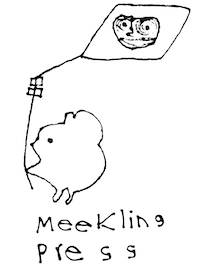
Girl, Cow & Monk
by Kate Wyer
Paperback
Publication date: 10/1/2020
ISBN 978-1-950987-08-5
$18 (Buy Online)
Open Kate Wyer’s GIRL, COW, & MONK and find interlinked novellas unfolding like a set of time-lapse portraits, united by their longing and inherent magic. In “Girl, Cow” a girl and her cow embark on a journey along the sea, going anywhere other than here; “Monk” follows the mysteries and austerity of monastic life, a vow of silence, desire and a (re)discovery of voice.
Read an excerpt in West Branch.
About the Author
Kate Wyer is the author of the novels Black Krim and Land Beast. Her work has appeared in West Branch, The Rupture, Necessary Fiction, Hobart, Unsaid and other journals. She works in the public mental health system of Maryland. She is also a somatics teacher and a registered yoga teacher.
Praise for Girl, Cow & Monk
“A girl walks into the ocean. A monk interrogates his walls. This beautiful book got into me, cast me like a rider on a slow amusement. It is calibrated to make you remember yourself—as a moving body, as a dynamic sensory index—all in precise, glowing language that skips the everyday. It invites you to imagine other ways of existing in your own time, to realize yourself anew in the context of your own skin. Its point is not transcendence but instead: a velcro disengagement from the mundane, toward a sublime, enveloping sensation: a tidal carry, a silent room, a sound bath. GIRL, COW, & MONK is a profoundly somatic marvel. I loved it.”—Amanda Goldblatt
“Kate Wyer’s poetic, elegiac fiction is a necessary salve for anyone who yearns for the disappearing natural world. GIRL, COW, & MONK is a captivating, figurative portrait of the search for an authentic self—and of grief at the traditions sacrificed to the quest. I loved this novella! Like an illuminated manuscript, GIRL, COW, & MONK glitters with strange symbols and enduring truths.”—Kate Reed Petty
“Wyer writes with the eye and ear of a poet, her prose spare and resonant, her perceptions original, quiet, strange, and strangely moving, as when she describes silence as ‘the tsk tsk of straw brooms cleaning some corner, some hallway.’ Wyer shows us ways of experiencing the world that run the risk, in our current time, of being forgotten.”—Elizabeth Spires
